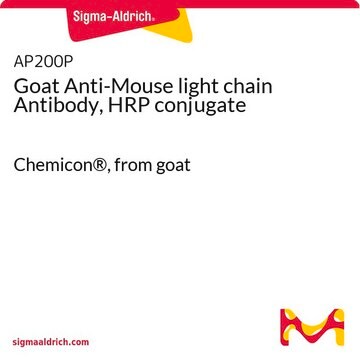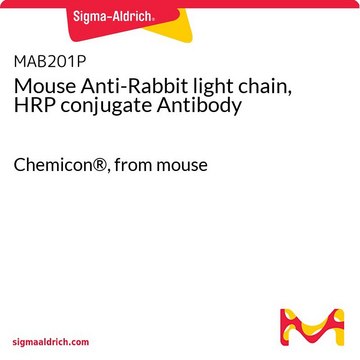MAB201
Mouse Anti-Rabbit light chain Antibody
Chemicon®, from mouse
Faça loginpara ver os preços organizacionais e de contrato
About This Item
Código UNSPSC:
12352203
eCl@ss:
32160702
NACRES:
NA.46
Produtos recomendados
fonte biológica
mouse
Nível de qualidade
conjugado
unconjugated
forma do anticorpo
ascites fluid
clone
monoclonal
reatividade de espécies
rabbit
fabricante/nome comercial
Chemicon®
técnica(s)
ELISA: suitable
western blot: suitable
Isotipo
IgG1κ
Condições de expedição
wet ice
modificação pós-traducional do alvo
unmodified
Descrição geral
Antibody molecules typically comprise two immunoglobulin light chains covalently bound to a pair of heavy chains. Immunoglobulin light chains occur in two types, designated by the Greek letters kappa and lambda. Kappa and gamma light chains are approximately 250 amino acids in length with an average mass of about 25 kDa. The ratio of kappa to lambda found in the immunoglobulin population varies by species.
Especificidade
Minimal cross-reaction with bovine, goat, Armenian hamster, horse, human, mouse, rat, and sheep.
The antibody reacts strongly with native primary antibodies primarily with kappa light chains. It is not suitable for detecting lambda light chains. The antibody does not react with the heavy chain of rabbit IgG. The antibody has been tested by ELISA and adsorbed to ensure minimal cross-reaction with bovine, goat, Armenian hamster, horse, human, mouse, rat, and sheep immunoglobulins.
Imunogênio
Epitope: Kappa light chain
Prepared from rabbit IgG light chain.
Aplicação
Research Category
Secondary & Control Antibodies
Secondary & Control Antibodies
Research Sub Category
Fragment Specific Secondary Antibodies
Fragment Specific Secondary Antibodies
This Mouse anti-Rabbit light chain Antibody is validated for use in ELISA, WB for the detection of Rabbit light chain.
Descrição-alvo
25 kDa
forma física
Ascites
Isolated from ascites by chromatographic procedures. Liquid in 0.01M Sodium Phosphate, 0.25M NaCl, pH 7.6.
Armazenamento e estabilidade
Maintain refrigerated at 2°-8°C under sterile conditions for up to twelve months from date of receipt. Avoid repeated freeze/thaw cycles.
Informações legais
CHEMICON is a registered trademark of Merck KGaA, Darmstadt, Germany
Exoneração de responsabilidade
Unless otherwise stated in our catalog or other company documentation accompanying the product(s), our products are intended for research use only and are not to be used for any other purpose, which includes but is not limited to, unauthorized commercial uses, in vitro diagnostic uses, ex vivo or in vivo therapeutic uses or any type of consumption or application to humans or animals.
Código de classe de armazenamento
12 - Non Combustible Liquids
Classe de risco de água (WGK)
WGK 2
Ponto de fulgor (°F)
Not applicable
Ponto de fulgor (°C)
Not applicable
Certificados de análise (COA)
Busque Certificados de análise (COA) digitando o Número do Lote do produto. Os números de lote e remessa podem ser encontrados no rótulo de um produto após a palavra “Lot” ou “Batch”.
Já possui este produto?
Encontre a documentação dos produtos que você adquiriu recentemente na biblioteca de documentos.
Charles E Evans et al.
Neurobiology of aging, 75, 136-149 (2018-12-21)
β-Amyloid (Aβ) accumulation is an early event of Alzheimer's disease (AD) pathogenesis. Inhibition of Aβ production by β-secretase (BACE) has been proposed as a potential therapeutic strategy for AD. However, BACE inhibitors lack specificity and have had limited clinical benefit.
Javier Garzón-Niño et al.
International journal of molecular sciences, 24(1) (2023-01-09)
The opioid peptide β-endorphin coexists in the pituitary and brain in its αN-acetylated form, which does not bind to opioid receptors. We now report that these neuropeptides exhibited opposite effects in in vivo paradigms, in which ligands of the sigma
Michael J Tuvim et al.
The Journal of biological chemistry, 284(15), 9781-9787 (2009-02-12)
Synaptotagmin 2 (Syt2) functions as a low affinity, fast exocytic Ca(2+) sensor in neurons, where it is activated by Ca(2+) influx through voltage-gated channels. Targeted insertion of lacZ into the mouse syt2 locus reveals expression in mucin-secreting goblet cells of
Jung-Lin Wu et al.
Nature communications, 7, 12526-12526 (2016-08-25)
Crosslinking of B-cell receptor (BCR) sets off an apoptosis programme, but the underlying pathways remain obscure. Here we decipher the molecular mechanisms bridging B-cell activation and apoptosis mediated by post-translational modification (PTM). We find that O-GlcNAcase inhibition enhances B-cell activation
Nossa equipe de cientistas tem experiência em todas as áreas de pesquisa, incluindo Life Sciences, ciência de materiais, síntese química, cromatografia, química analítica e muitas outras.
Entre em contato com a assistência técnica








